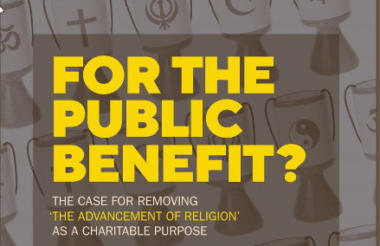The National Secular Society has published a report arguing that "the advancement of religion" should no longer be a charitable purpose and that scrapping it could help to restore trust in charities and relieve pressure on the Charity Commission.
In a report, For the public benefit?, published today, The National Secular Society has said that the advancement of religion is not an inherent public good, and that this purpose gives religious organisations a privileged position in society which can be misused. It has recommended that it is scrapped as a charitable purpose.
It has also written to the minister for civil society, Mims Davies, asking for a meeting to discuss its findings.
The report found that 12,000 charities, 7 per cent of total registered charities, list the advancement of religion as their sole charitable aim. It also found that 25 per cent of large religious charities only exist to promote religion.
It claimed that some charities used the advancement of religion to promote practices like gay conversion therapy, infant circumcision and animal slaughter. It said that some of these charities are also partisan, which is prohibited by the Commission.
The report argued that removing charitable status from these charities would be in keeping with public opinion because 53 per cent of the British public report that they have no religion.
It added that, with fewer charities to regulate, pressure on the regulator would lesson. It also claimed that, due to controversies that have occurred within the religious charity sector, the measure would mitigate against the public’s falling trust in the charity sector.
Outlining the perceived benefits for religious charities, the report added that many religious organisations are compelled to register for charitable status, under law, due to the fact that the advancement of religion is a charitable purpose. It said that this strangles their ability to campaign politically, and said that removing advancing religion as a purpose would “give religious organisations considerably more freedom to manage their affairs without abiding by the strict rules and requirements of the charity”.
Charity law
Under the Charities Act 2011 there are 13 charitable purposes. These include the prevention or relief of poverty, the advancement of education and the advancement of animal welfare.
The advancement of religion as a charitable purpose includes the provision of places of worship, carrying out religious devotional acts, missionary and outreach work, raising awareness and understanding of religious beliefs and practices.
The report called for six recommendations to be upheld to improve the management of religious charities by the Commission, including ensuring: “equal and neutral treatment of religious and non-religious charity”, “tangible evidence of public benefit”, “an emphasis on supporting communities”, and “effective use of taxpayer money”.
'Charities cannot take their privileged place in society for granted'
Stephen Evans, chief executive of the National Secular Society, said: “Charities cannot take their privileged place in society for granted. They must show they deserve it. Too many faith-based charities are causing harm at the expense of the taxpayer. Tax breaks are allowing these organisations, under the guise of ‘charity’, to facilitate harmful activities that do not align with British values and opinion.
“Under our proposed reforms, organisations that serve no charitable purpose aside from advancing a religion would no longer be able to be charities, meaning that they would have to pay tax like any other non-charitable organisation.
“This change is overdue and in the public interest. It would help to restore public confidence in the charity system, restore money to the public purse, relieve the burden on charity regulators and give religious organisations greater independence from the state.
“Advancing religion is not an unqualified good. In some cases it has no public benefit and in others it is actively harmful. Religious organisations that wish to be registered as charities should be required to demonstrate that they serve a genuine public benefit under another charitable heading, for example because they alleviate poverty.”
In a letter to minister for sport and civil society, Mims Davies, last week, the society emphasised its concerns.
It said: “Removing the advancement of religion from the list of charitable purposes would require religious charities to justify their charitable status in exactly the same way that secular organisations must do. In this way, not only could the public begin to rebuild its trust in the trust in the charitable sector, but it could develop a greater confidence that the taxpayer is only supporting the charities that genuinely deliver a public benefit.”
Commission response
A Charity Commission spokeswoman said that it is not within the Commission’s discretion to amend charitable purposes. They said: “We are aware of the National Secular Society’s report on charity and will review it carefully. As a general principle: like all charities, a small proportion of religious charities are misused by others and used in ways the public would not expect. The Commission deals with these issues robustly where they arise.”
Editor's note
The headline has been corrected. The National Secular Society is a non-profit campaigning organisation but not a registered charity.
|
Related articles












